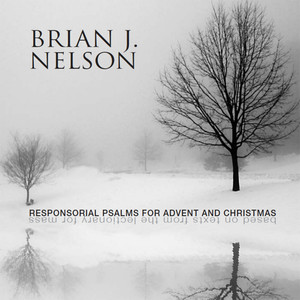
Responsorial Psalms for Advent and Christmas
- 流派:Jazz 爵士
- 语种:英语
- 发行时间:2009-11-19
- 类型:录音室专辑
- 歌曲
- 时长
简介
Program Notes The Book of Psalms is in many respects the “hymnal” of the Bible, containing literally one-hundred fifty canticles which express the various experiences and aspirations of the ancient People of God. The psalms reflect Israel’s joys, sorrows, praises, hopes, ambitions, lamentations and even frustrations before the living God. Their place in Jewish worship is unparalleled. They found a ready home in the early worship of the Christian community, and remain the singular means by which the People of God can use the very Word of God to offer prayer to God. Two great cycles mold the western Christian calendar: the Easter Cycle, which includes Lent, Holy Week and Eastertide, and the Christmas Cycle, which moves from the season of Advent, a time of preparing for the coming of the Lord, through the Christmas feasts, which each commemorate an early manifestation of Christ to the world. Advent, from the Latin adventus, means “the coming” and was used by ancient Rome to refer to the visitation of the emperor (adventus divi, the coming of the divine). It is obvious why the ancient Roman Christians chose this term to describe that time when the sacred liturgy presents the coming of Christ, not only as a child in the manger, but also as the triumphant and sovereign Lord at the end of time. Christmastime comprises the collection of feasts which recall the early manifestations of Jesus: his birth (Nativity), his parents and his circumcision (Holy Family and the Mother of God), his being worshiped by the eastern Magi (Epiphany), and his manifestation to the world as the Son of God (Baptism). As a cycle, the seasons of Advent and Christmastime represent a kind of journey—from darkness to light, from expectation to fulfillment—as an expressed hope for the reign of God is fulfilled in time and eternity. The psalmody employed by the Church during these seasons parallels this journey. The Word of God exhorts the faithful to “Let the Lord enter” (Psalm 24) as Advent draws to a close; then this exhortation becomes an exultation: “Cry out with joy and gladness, for among you is the Holy One of Israel” (Isaiah 12). Each journey made has both a beginning and a fulfillment. Consider the sequence of texts employed at the various stops during the liturgical trek from the prophecy of the coming of the Lord to his manifestation before his people: “Lord, make us turn to you, let us see your face…” (Psalm 80) “Lord, come and save us.” (Psalm 146) “Let us go rejoicing to the house of the Lord!” (Psalm 122) “Forever I will sing the goodness of the Lord.” (Psalm 89) “Today is born our Savior, Christ the Lord.” (Psalm 96) “A light will shine on us this day: the Lord is born for us.” (Psalm 97) “Blessed are they who dwell in your house, O Lord.” (Psalm 84) “Lord, every nation on earth will adore you.” (Psalm 72) – Michael Podrebarac, Director, St. Lawrence Choir ========= Brian J. Nelson Composer Brian Nelson was born in Madison, Wisconsin and received his Bachelor of Composition from the University of Michigan in 1990 where he studied with William Bolcom, William Albright and Nick Thorne. He completed a Master’s Degree in Composition at the University of Wisconsin, Madison in May 2000. He is a prolific composer of sacred music as well as chamber and orchestral pieces. Recent works include Elegiac Folk Song for French Horn and Piano - commissioned by Alice Codiek; Ballade for Violin and Piano, which will receive its premiere recording by violinist Tami Lee Hughes and pianist Ellen Bottorff as part of Brian’s forthcoming Vocalise CD; Capriccio for Flute, Oboe and Piano, commissioned by the Allégresse Trio; and Responsorial Psalms for Advent and Christmas, a collection of responsories based on the Catholic lectionary—many of which are included in this recording. Brian is currently a Doctor of Musical Arts student in Composition at the University of Kansas School of Music, Lawrence, Kansas, where he studies with James Barnes. He is also a teaching assistant for music theory there, and taught at Benedictine College in Atchison, KS, prior to beginning his doctoral studies. He is a member of the St. Lawrence Choir. A committed Catholic, Brian is known for his cheerful, professional approach. He works well with professionals, amateurs and young people, and feels a particularly strong commitment to local cultural life. He can be contacted through his website, www.nelsonmusic.com. ===== The St. Lawrence Choir The tradition of a liturgical choir at the St. Lawrence Catholic Campus Center dates back to the late 1980’s with the building of a permanent chapel to house the worship of Catholic students, staff and faculty at the University of Kansas. Accompanied by the Edith Cubbison-Darby Memorial Organ, a 27-rank mechanical action organ built by the Andover Company of Lawrence, Massachusetts, the St. Lawrence Choir strives to preserve and promote the “vast treasury of sacred music,” as the fathers of the Second Vatican Council termed it. Offering music for the sacred liturgy ranging from Gregorian Chant to sixteenth century sacred polyphony to modern choral works, the student and permanent community members of mthis liturgical choir believe that music is integral to the celebration of the sacred liturgy, and that the goal of sacred music is, as the Church has aptly expressed it, the “glory of God and the sanctification of the faithful.” Part of the aspiration of the choir is to seek out and offer for the liturgy newly created “treasures” of sacred repertoire. The choir has been grateful to learn and sing a number of compositions of Brian J. Nelson, including some of the psalms featured in this collection, as well as his setting of the prayer of St. John Chrysostom, “Of Thy Mystical Supper.” – Michael Podrebarac



